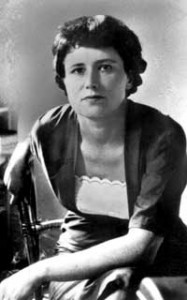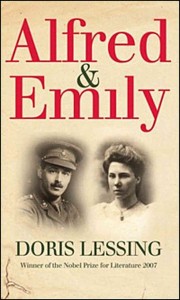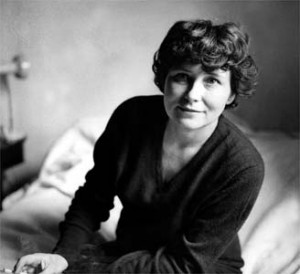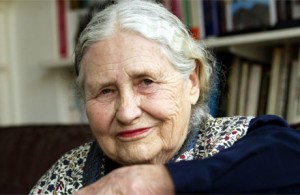Doris Lessing
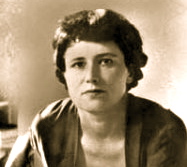
Doris Lessing about the Sufi Way
Doris Lessing reading from her 1971 article, “An Ancient Way to New Freedom.”
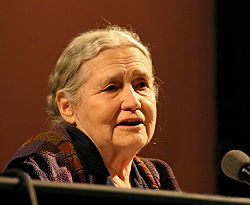 Lessing at the Lit Cologne literary festival in 2006
Lessing at the Lit Cologne literary festival in 2006
Doris May Lessing CH (née Tayler; 22 October 1919 – 17 November 2013) was a British novelist, poet, playwright, librettist, biographer and short story writer. Her novels included The Grass is Singing (1950), the sequence of five novels collectively called Children of Violence (1952–69), The Golden Notebook (1962), The Good Terrorist (1985), and five novels collectively known as Canopus in Argos: Archives (1979–1983).
Lessing was awarded the 2007 Nobel Prize in Literature. In awarding the Prize the Swedish Academy described her as “that epicist of the female experience, who with scepticism, fire and visionary power has subjected a divided civilisation to scrutiny.” Lessing was the eleventh woman and the oldest person ever to receive the Nobel Prize in Literature.
In 2001, Lessing was awarded the David Cohen Prize for a lifetime’s achievement in British literature. In 2008, The Times ranked her fifth on a list of “The 50 greatest British writers since 1945.”
Lessing was born in Kermanshah, Iran, then known as Persia, on 22 October 1919, to Captain Alfred Tayler and Emily Maude Tayler (née McVeagh), who were both English and of British nationality. Her father, who had lost a leg during his service in World War I, met his future wife, a nurse, at the Royal Free Hospitalwhere he was recovering from his amputation. Alfred Tayler and his wife moved to Kermanshah, Iran, in order to take up a job as a clerk for the Imperial Bank of Persia and it was there that Doris was born in 1919. The family then moved to the British colony of Southern Rhodesia (now Zimbabwe) in 1925 to farm maize, among other plants, when her father purchased around one thousand acres of bush. Lessing’s mother attempted to lead an Edwardian lifestyle amidst the rough environment, which would have been easy had the family been wealthy; in reality, such a lifestyle was not feasible. The farm failed to deliver any monetary value in return.
Lessing was educated at the Dominican Convent High School, a Roman Catholic convent all-girls school in Salisbury (now Harare). She left school at the age of 14, and was self-educated from then on; she left home at 15 and worked as anursemaid. She started reading material that her employer gave her on politics and sociology and began writing around this time. In 1937, Lessing moved to Salisbury to work as a telephone operator, and she soon married her first husband, Frank Wisdom, with whom she had two children (John and Jean), before the marriage ended in 1943.
After her first divorce, Lessing’s interest was drawn to the popular community of the Left Book Club, a communist book club which she had joined the year before. It was here that she met her future second husband, Gottfried Lessing. They were married shortly after she joined the group, and had a child together (Peter), before the marriage failed and ended in divorce in 1949. After these two failed marriages, she did not marry again. Gottfried Lessing later became the East German ambassador to Uganda, and was murdered in the 1979 rebellion against Idi Amin Dada.
When she fled to London to pursue her writing career and communist beliefs, Lessing left two toddlers with their father in South Africa (another, from her second marriage, went with her). She later said that at the time she thought she had no choice: “For a long time I felt I had done a very brave thing. There is nothing more boring for an intelligent woman than to spend endless amounts of time with small children. I felt I wasn’t the best person to bring them up. I would have ended up an alcoholic or a frustrated intellectual like my mother.”
The German politician Gregor Gysi is a nephew of her second husband.
Because of her campaigning against nuclear arms and apartheid, Lessing was banned from South Africa and Rhodesia for many years. She moved to London with her youngest son in 1949. Her first novel, The Grass is Singing, was published in 1950. Her breakthrough work, The Golden Notebook, was written in 1962.
In 1982, Lessing attempted to publish two novels under a pseudonym, Jane Somers, to show the difficulty new authors faced in trying to have their works in print. The novels were declined by Lessing’s UK publisher, but was later accepted by another English publisher, Michael Joseph, and in the US by Alfred A. Knopf. The Diary of a Good Neighbour was published in England and the US in 1983, and If the Old Could in both countries in 1984, both as written by Jane Somers. In 1984, both novels were re-published in both countries (Viking Books publishing in the US), this time under one cover, with the title The Diaries of Jane Somers: The Diary of a Good Neighbor and If the Old Could, listing Doris Lessing as author instead of listing Jane Somers.
She declined a damehood, but accepted appointment as a Companion of Honour at the end of 1999 for “conspicuous national service.” She was also made a Companion of Literature by the Royal Society of Literature.
 In 2007, Lessing was awarded the Nobel Prize in Literature. She received the prize at the age of 88 years 52 days, making her the oldest winner of the literature prize at the time of the award and the third oldest Nobel Laureate in any category (afterLeonid Hurwicz and Raymond Davis Jr.). She also was only the eleventh woman to be awarded the Nobel Prize for Literature by the Swedish Academy in its 106-year history. Lessing was out shopping for groceries when the announcement came, arriving home to tell reporters who had gathered there, “Oh Christ!” She told reporters outside her home, “I’ve won all the prizes in Europe, every bloody one, so I’m delighted to win them all. It’s a royal flush.” She titled her Nobel Lecture On Not Winning the Nobel Prize and used it to draw attention to global inequality of opportunity, and to explore changing attitudes to storytelling and literature.
In 2007, Lessing was awarded the Nobel Prize in Literature. She received the prize at the age of 88 years 52 days, making her the oldest winner of the literature prize at the time of the award and the third oldest Nobel Laureate in any category (afterLeonid Hurwicz and Raymond Davis Jr.). She also was only the eleventh woman to be awarded the Nobel Prize for Literature by the Swedish Academy in its 106-year history. Lessing was out shopping for groceries when the announcement came, arriving home to tell reporters who had gathered there, “Oh Christ!” She told reporters outside her home, “I’ve won all the prizes in Europe, every bloody one, so I’m delighted to win them all. It’s a royal flush.” She titled her Nobel Lecture On Not Winning the Nobel Prize and used it to draw attention to global inequality of opportunity, and to explore changing attitudes to storytelling and literature.
The lecture was later published in a limited edition to raise money for children made vulnerable by HIV/AIDS. In a 2008 interview for the BBC‘s Front Row, she stated that increased media interest after the award had left her without time or energy for writing. Her final book, Alfred and Emily, appeared in 2008.
A 2010 BBC radio documentary titled Useful Idiots listed among “useful idiots” of Joseph Stalin several prominent British writers, including Doris Lessing.
During the late 1990s, Lessing suffered a stroke which stopped her from travelling during her later years and focused her mind on death. She died on 17 November 2013 at her home in London.
Fiction
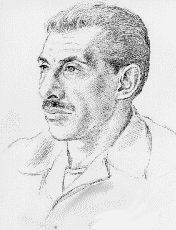 Idries Shah, who introduced Lessing to Sufism
Idries Shah, who introduced Lessing to Sufism
Lessing’s fiction is commonly divided into three distinct phases: the Communist theme (1944–1956), when she was writing radically on social issues (to which she returned in The Good Terrorist [1985]), the psychological theme (1956–1969), and after that the Sufi theme, which was explored in the Canopus in Argos sequence of science fiction (or as she preferred to put it “space fiction”) novels and novellas. Doris Lessing’s first novel The Grass Is Singing, the first four volumes of The Children of Violence sequence, as well as the collection of short stories African Stories are set in Southern Rhodesia (now Zimbabwe).
Lessing’s Canopus sequence was not popular with many mainstream literary critics. For example, in theNew York Times in 1982 John Leonard wrote in reference to The Making of the Representative for Planet 8 that “[o]ne of the many sins for which the 20th century will be held accountable is that it has discouraged Mrs. Lessing… She now propagandises on behalf of our insignificance in the cosmic razzmatazz,” to which Lessing replied: “What they didn’t realise was that in science fiction is some of the best social fiction of our time. I also admire the classic sort of science fiction, like Blood Music, by Greg Bear. He’s a great writer.” Unlike some authors primarily known for their mainstream work, she has never hesitated to admit that she wrote science fiction and attended the 1987 World Science Fiction Convention as its Writer Guest of Honor. Here she made a well-received speech in which she described her dystopian novel Memoirs of a Survivor as “an attempt at an autobiography.”
African Laughter
When asked about which of her books she considers most important, Lessing chose the Canopus in Argos sequence. These novels present an advanced interstellar society’s efforts to accelerate the evolution of other worlds, including Earth. (Similar concepts occur in science fiction by other authors, e.g. the Progressor and Uplift sequences.) Using Sufi concepts, to which Lessing had been introduced in the mid-1960s by her “good friend and teacher” Idries Shah, the series of novels also utilises an approach similar to that employed by the early 20th century mystic G. I. Gurdjieff in his work All and Everything. Earlier works of “inner space” fiction like Briefing for a Descent into Hell (1971) and Memoirs of a Survivor (1974) also connect to this theme. Lessing’s interest had turned to Sufism after coming to the realisation that Marxism ignored spiritual matters, leaving her disillusioned.
Lessing’s novel The Golden Notebook is considered a feminist classic by some scholars, but notably not by the author herself, who later wrote that its theme of mental breakdowns as a means of healing and freeing one’s self from illusions had been overlooked by critics. She also regretted that critics failed to appreciate the exceptional structure of the novel. She explained inWalking in the Shade that she modelled Molly partly on her good friend Joan Rodker, the daughter of the modernist poet and publisher John Rodker.
Lessing did not like the idea of being pigeonholed as a feminist author. When asked why, she explained:
“What the feminists want of me is something they haven’t examined because it comes from religion. They want me to bear witness. What they would really like me to say is, ‘Ha, sisters, I stand with you side by side in your struggle toward the golden dawn where all those beastly men are no more.’ Do they really want people to make oversimplified statements about men and women? In fact, they do. I’ve come with great regret to this conclusion.?
—Doris Lessing, The New York Times, 25 July 1982
Doris Lessing Society
The Doris Lessing Society is dedicated to supporting the scholarly study of Lessing’s work. The formal structure of the Society dates from January 1977, when the first issue of the Doris Lessing Newsletter was published. In Spring, 2002 the Newsletter became the academic journal, Doris Lessing Studies. The Society also organizes panels at the Modern Languages Association (MLA) annual Conventions and has held two international conferences in New Orleans in 2004 and Leeds in 2007.
Archive
Lessing’s largest literary archive is held by the Harry Ransom Humanities Research Center, at the University of Texas at Austin. The 45 archival boxes of Lessing’s materials at the Ransom Center contain nearly all of her extant manuscripts and typescripts up to 1999. Original material for Lessing’s early books is assumed not to exist because she kept none of her early manuscripts. Other institutions, including the McFarlin Library at the University of Tulsa, hold smaller collections.
- Somerset Maugham Award (1954)
- Prix Médicis étranger (1976)
- Austrian State Prize for European Literature (1981)
- Shakespeare-Preis der Alfred Toepfer Stiftung F. V. S., Hamburg (1982)
- WH Smith Literary Award (1986)
- Palermo Prize (1987)
- Premio Internazionale Mondello (1987)
- Premio Grinzane Cavour (1989)
- James Tait Black Memorial Prize for biography (1995)
- Los Angeles Times Book Prize (1995)
- Premi Internacional Catalunya (1999)
- Order of the Companions of Honour (1999)
- Companion of Literature of the Royal Society of Literature (2000)
- David Cohen Prize (2001)
- Premio Príncipe de Asturias (2001)
- S.T. Dupont Golden PEN Award (2002)
- Nobel Prize in Literature (2007)

